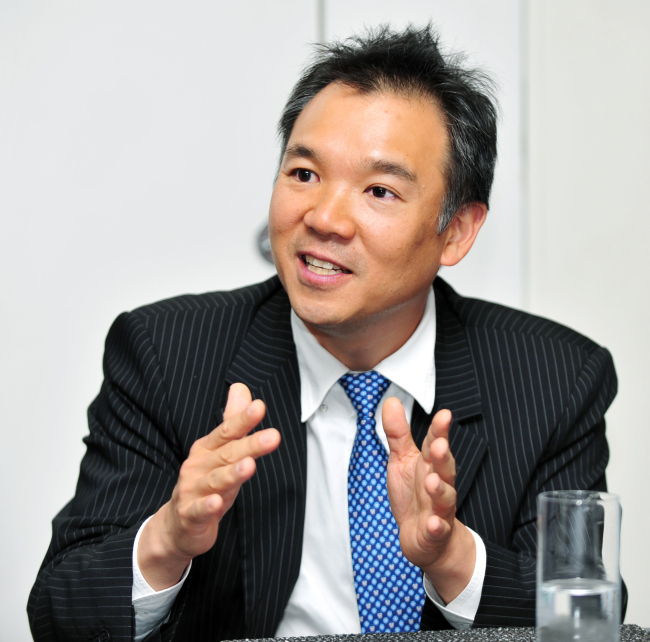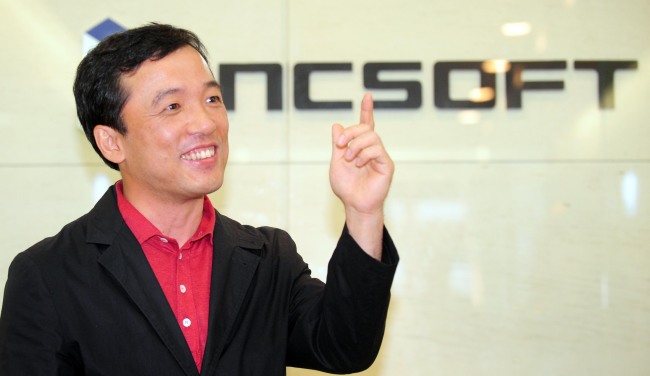There are no permanent friends or enemies in business. This maxim seems to hold true in relations between South Korean game developer NCSoft and its largest shareholder Nexon, which are at odds over management control.
Market analysts said the escalating tug of war between the two game firms would benefit foreign investors.
“Since most of the foreign investors of NCSoft are fund trustees and hold around a 2 percent share or less, there are few chances for them to take any concerted action in regard to the recent incident between the two companies,” said Ko Hoon, an analyst from Mirae Asset. “But they will benefit from the latest development since both Nexon and NCSoft will competitively try to give more value, for example by increasing dividends per share, to receive support from their investors.”
 |
| Nexon chairman Kim Jung-ju |
 |
| NCSoft CEO Kim Taek-jin |
Currently Nexon, together with its Korean affiliate Nexon Korea, is the largest shareholder of NCSoft with a 15.08 percent share, followed reportedly by NCSoft, with 8.99 percent; the National Pension Service of Korea, with 6.88 percent; the Government Pension Fund Global run by the Norwegian government, with 2.44 percent; Morgan Stanley, with 0.8 percent; and British financial firm Legal and General Group, with 0.45 percent.
The foreign institutional investors said they were keeping their ear to the ground.
“We have invested in NCSoft so we have of course been following the news,” said a public relations official from London-based Somerset Capital Management LLP. The official declined to comment further due to concerns over the possible impact on stock prices. The U.K. investment firm holds 161,591 shares, accounting for 0.74 percent, in NCSoft.
While paying close attention to the development of the power struggle between the two managements, many global institutional investors in NCSoft were also staying quiet about the matter.
Seoul-based NCSoft and Tokyo-based Nexon ― long-term partners as well as competitors in the game business ― have clashed head-on since Nexon announced in January that it would participate in NCSoft’s management.
Both NCSoft and Nexon are slated to release their annual earnings next week, and NCSoft’s shareholders meeting is scheduled in March. NCSoft CEO Kim Taek-jin’s tenure is set to end in the same month, but market watchers expect him to retain the position.
From friends to foes
The rivalry and partnership between the two companies dates back to the mid-1990s, when NCSoft CEO Kim and Nexon chairman Kim Jung-ju ― alumni of Seoul National University ― jumped into the PC game industry at the same time.
Even though they were good friends, their perspectives on business management differed greatly.
Nexon has been growing mainly through aggressive mergers and acquisitions of small- and medium-sized game companies, while NCSoft has been focusing on developing in-house games.
Nexon’s decision to move its headquarters from Seoul to Tokyo in December 2011 was also part of the Nexon chairman’s grandiose plan to lead the world’s game industry. The firm, however, has failed to release hits since “Maple Story,” an RPG for PCs launched in 2003.
NCSoft, on the other hand, has developed a series of hit massively multiplayer online role-playing games including “Lineage 2,” “Aion,” and “Blade & Soul” over the past 18 years. Considering that it takes about five years to develop an MMORPG, the company’s achievements have been significant, according to market watchers.
The close relationship, which had lasted for more than 20 years, finally started cracking after their joint efforts to acquire U.S.-based game developer Electronic Arts, best known for its football video game series “FIFA,” came to no avail in 2012.
They wanted to catapult themselves into the top echelon of the global game industry by taking over the U.S. game developer, which then held the largest pool of game-related patents.
Their joint projects to develop games including “Mabinogi 2: Arena” and “Maple Story 2” also bore no fruit.
To make matters worse, rumors went viral in the market that Nexon had tried to take over NCSoft when the firm, which had held a 14.68-percent share, bought an additional 0.4 percent in October 2014 to become the largest shareholder. At the time, Nexon’s Kim explained that the stock purchase was “just a mere investment,” but he recently announced that the aim of the purchase had been to increase his grip on the competitor.
“Management involvement by Nexon in NCSoft will bring nothing but bad consequences due to the disparate businesses models and corporate cultures of the two firms,” an NCSoft official said.
Market analysts said that neither company was likely to make a rash move as they would not want to damage their corporate values.
“They will try to agree on some important issues including the appointment of board of directors at the shareholders meeting in March,” said Oh Dong-hwan, an analyst from Samsung Securities.
By Kim Young-won (wone0102@heraldcorp.com)

